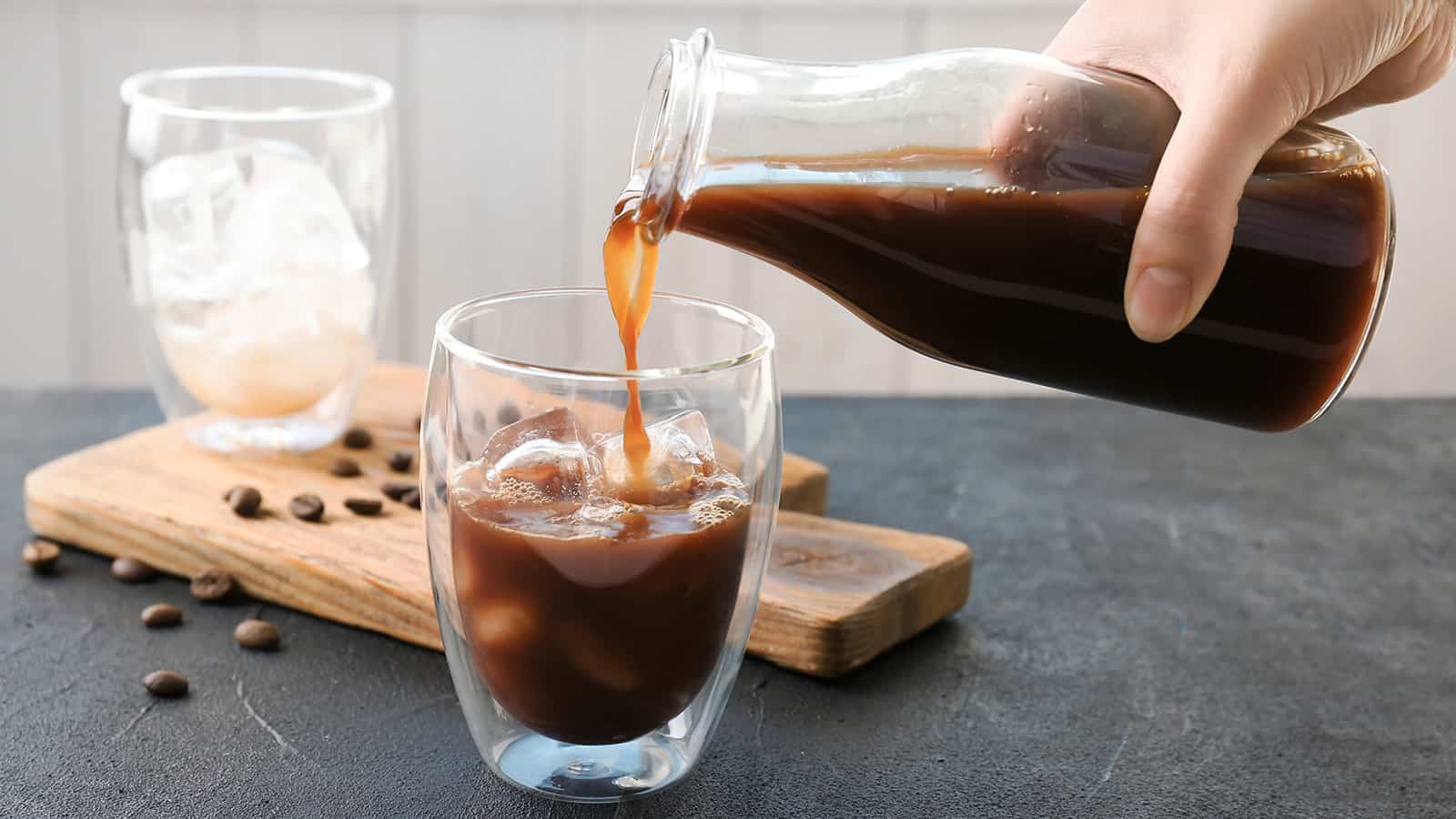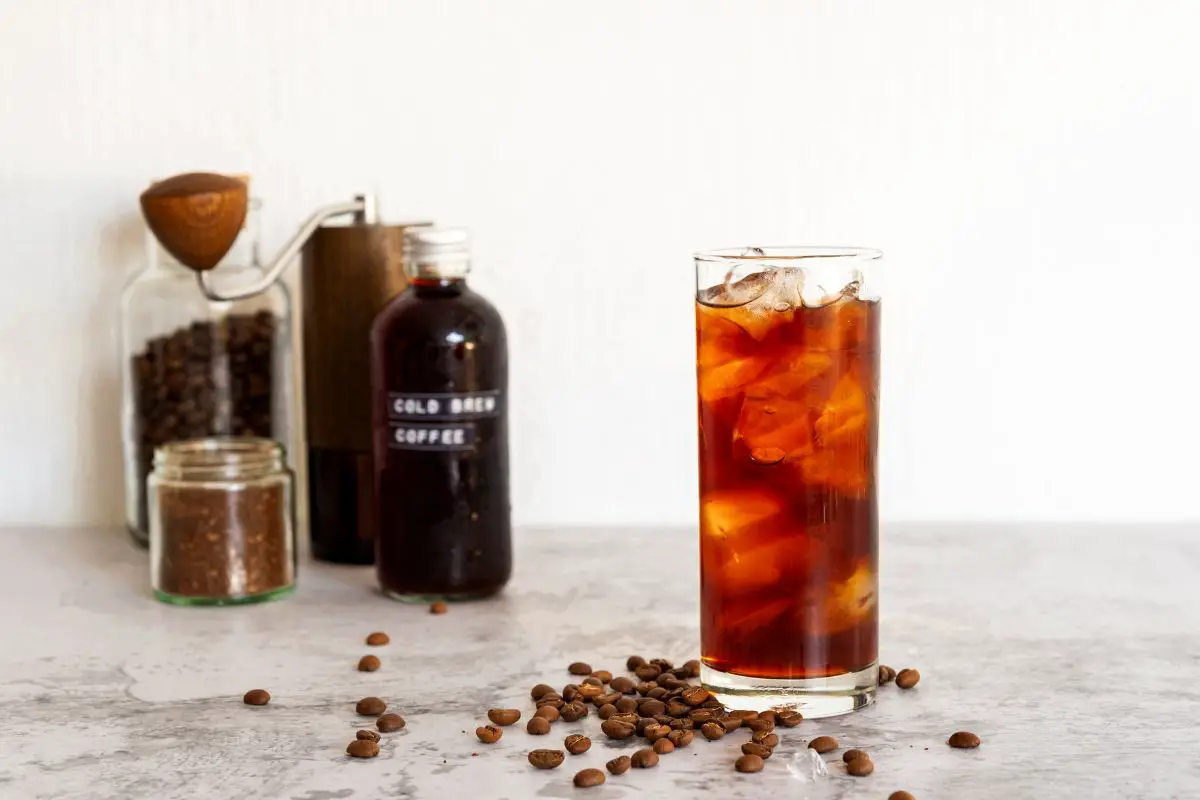In the realm of intermittent fasting, there exists an intriguing query: does the consumption of cold brew undermine the efficacy of a fast? This question warrants careful consideration, as adherents of intermittent fasting seek to optimize their health and well-being through this dietary practice. To address this matter, it is imperative to delve into the intricacies of intermittent fasting, decipher the nutritional composition of cold brew, evaluate its impact on insulin levels, and examine its effect on autophagy.

New Africa/shutterstock.com
By adhering to these principles, we can ascertain whether cold brew is a suitable beverage for those pursuing a fasting regimen. In this article, we will explore the scientific evidence surrounding the compatibility of cold brew with fasting protocols, providing an informative and analytical analysis to ensure the safety and efficacy of fasting practices.
Key Takeaways
- Cold brew can be consumed during fasting as it generally has fewer calories, carbs, and fat compared to hot brewed coffee.
- Cold brew should be consumed without additives or sweeteners to avoid inhibiting autophagy.
- Cold brew with filtered water and suitable brewing time can contribute to cleaner extraction of beneficial compounds.
- Consuming cold brew during the fasting window can help maintain the fasted state for an extended period and support sustained autophagy.
Understanding Intermittent Fasting
Intermittent fasting is a dietary approach that involves alternating periods of eating and fasting, and it is important to understand its principles in order to make informed choices about what can be consumed during the fasting window.
During the fasting phase, the body relies on stored energy, such as glycogen in the liver, to fuel its functions. By allowing the body to deplete its glycogen stores, intermittent fasting aims to promote fat burning and weight loss. This fasting period typically lasts for 16-24 hours, although there are variations in the duration and frequency of fasting depending on the specific fasting protocol.
To adhere to the principles of intermittent fasting, it is essential to avoid consuming any calories or nutrients during the fasting window. This means that only water, black coffee, and unsweetened tea are generally allowed. These beverages are considered to have minimal impact on insulin levels and do not disrupt the fasting state. However, it is important to note that some sources argue that consuming anything other than water can break a fast, as it may potentially stimulate the digestive system and trigger an insulin response.
Exploring the nutritional content of cold brew, specifically its impact on fasting, is crucial in understanding whether it can be consumed while fasting.
Exploring the Nutritional Content of Cold Brew
Examining the Nutritional Composition of Chilled Extracted Coffee, specifically cold brew, is essential to understanding its impact on fasting. Cold brew is made by steeping coffee grounds in cold water for an extended period, resulting in a less acidic and smoother beverage compared to hot brewed coffee.
In terms of nutritional content, cold brew generally contains fewer calories, carbohydrates, and fat compared to traditional hot brewed coffee. This makes it a suitable choice for individuals following a low-calorie or low-carbohydrate diet.
Cold brew also contains a moderate amount of caffeine, which can provide a boost of energy during fasting periods. Additionally, it contains antioxidants that have been associated with various health benefits, such as reducing inflammation and protecting against certain chronic diseases.
However, it is important to note that cold brew does not contain any significant amounts of protein, vitamins, or minerals. Therefore, it should not be relied upon as a sole source of nutrition during fasting periods.
Cold brew is a refreshing and low-calorie beverage that can be consumed during fasting periods. Its moderate caffeine content and antioxidant properties may provide some benefits. However, it is important to consider the overall nutritional needs and goals when incorporating cold brew into a fasting routine.
Transitioning to the subsequent section, we will explore the effects of cold brew on insulin levels.
Effects of Cold Brew on Insulin Levels

Investigating the impact of chilled extracted coffee on insulin levels reveals important insights into its potential effects on metabolic regulation during fasting periods. Cold brew, due to its unique brewing process, has been suggested to have a different impact on insulin levels compared to hot brewed coffee. Several studies have explored this relationship and have provided valuable information.
- Cold brew has been found to have a lower glycemic index compared to hot brewed coffee, meaning it causes a slower rise in blood sugar levels.
- The presence of certain compounds in cold brew, such as chlorogenic acid and caffeine, may contribute to its potential to improve insulin sensitivity.
- Cold brew has been shown to have a lower acid content than hot brewed coffee, which may be beneficial for individuals with insulin resistance or sensitive stomachs.
- Some studies have suggested that cold brew may have a positive effect on lowering fasting insulin levels, although more research is needed to confirm these findings.
Understanding the effects of cold brew on insulin levels is crucial for individuals who are fasting and want to ensure that their metabolic regulation is not disrupted.
Transitioning to the impact of cold brew on autophagy, further investigation is needed to determine whether this popular beverage can affect the cellular recycling process during fasting periods.
Impact of Cold Brew on Autophagy
Transitioning to the realm of autophagy, delving into the influence of chilled extracted coffee on the cellular recycling process during fasting periods necessitates further exploration. Autophagy is a natural cellular process that involves the breakdown and recycling of damaged or unnecessary components within cells. It plays a crucial role in maintaining cellular health and has been linked to various health benefits, including longevity and protection against diseases such as cancer and neurodegenerative disorders.
To understand the impact of cold brew on autophagy during fasting, a visual representation of ideas can be helpful. The following table presents a comparison of the potential effects of cold brew on autophagy:
Effects of Cold Brew on Autophagy
Positive Effects:
- Cold brew contains polyphenols and antioxidants that may support autophagy.
- Cold brew can provide a source of energy without disrupting the fasting state.
Neutral Effects:
- Cold brew might not directly stimulate autophagy.
- Cold brew alone may not significantly enhance autophagy.
Negative Effects:
- Consuming cold brew with added sugars or creamers may inhibit autophagy.
- Excessive consumption of cold brew may lead to overstimulation of autophagy, which could be detrimental.
It is important to note that the current understanding of the impact of cold brew on autophagy is limited, and more research is needed to draw definitive conclusions. Nevertheless, for those seeking to maximize the potential benefits of autophagy during fasting, considerations for successful fasting with cold brew should be taken into account.
Considerations for Successful Fasting with Cold Brew
Considering the potential impact of chilled extracted coffee on autophagy during fasting, certain factors must be taken into consideration to ensure successful implementation.
When incorporating cold brew into a fasting routine, it is important to understand that the primary objective of fasting is to achieve a state of autophagy, where cellular repair and regeneration occur. To maintain this state, it is crucial to avoid any substances that could potentially disrupt the fasting benefits.
One important consideration is the composition of the cold brew itself. It is advisable to use pure coffee beans without any additives or sweeteners. Additionally, the brewing process should focus on extracting the coffee’s beneficial compounds while minimizing the extraction of potentially harmful substances. The use of filtered water and a suitable brewing time can contribute to a cleaner extraction.
Another factor to consider is the timing of consumption. To maximize the fasting benefits, it is recommended to consume cold brew during the fasting window rather than the eating window. This ensures that the body remains in a fasted state for an extended period, allowing for sustained autophagy.
Furthermore, portion control is crucial. While cold brew is generally low in calories, excessive consumption can still lead to an intake of unwanted calories, potentially breaking the fast. It is essential to be mindful of portion sizes and not overindulge in cold brew during the fasting period.
Successful fasting with cold brew requires careful consideration of the coffee’s composition, timing of consumption, and portion control. By adhering to these factors, individuals can potentially enhance the fasting benefits and maintain the desired state of autophagy.
Frequently Asked Questions
Can I add milk or sugar to my cold brew while fasting?
Adding milk or sugar to cold brew while fasting may break the fast due to the caloric content and potential impact on blood sugar levels. It is advisable to consume plain black cold brew to ensure the integrity of the fasting period.
How does cold brew compare to hot brewed coffee in terms of fasting benefits?
Cold brew coffee has similar fasting benefits to hot brewed coffee. Both contain minimal calories and can help suppress appetite. However, adding milk or sugar to cold brew may break a fast due to their caloric content.
Does the caffeine in cold brew affect fasting in any way?
The caffeine in cold brew does not affect fasting as it does not provide any calories or nutrients. However, it may stimulate the central nervous system, similar to a car engine revving up before starting.
Can I drink flavored cold brew while fasting?
Flavored cold brew may contain added sugars or artificial sweeteners, which can disrupt fasting. It is recommended to consume plain cold brew to avoid any potential interference with fasting goals and to maintain the desired level of safety.
Is it better to drink cold brew before or after a workout while fasting?
When considering whether to drink cold brew before or after a workout while fasting, it is important to prioritize hydration and nutrient replenishment. The timing of cold brew consumption should be based on individual preferences and tolerance to caffeine.
Conclusion
In conclusion, cold brew does not break a fast when consumed in moderation. Intermittent fasting is a popular method for weight loss and improved overall health, and cold brew can be a suitable beverage choice during fasting periods. With negligible calories and a low impact on insulin levels, cold brew allows the body to continue experiencing the benefits of fasting.
However, it is essential to be mindful of the nutritional content and avoid adding sweeteners or creamers that may disrupt the fasting state. Interesting statistic: A typical serving of cold brew contains only 2-5 calories, making it a great option for those following an intermittent fasting protocol.
